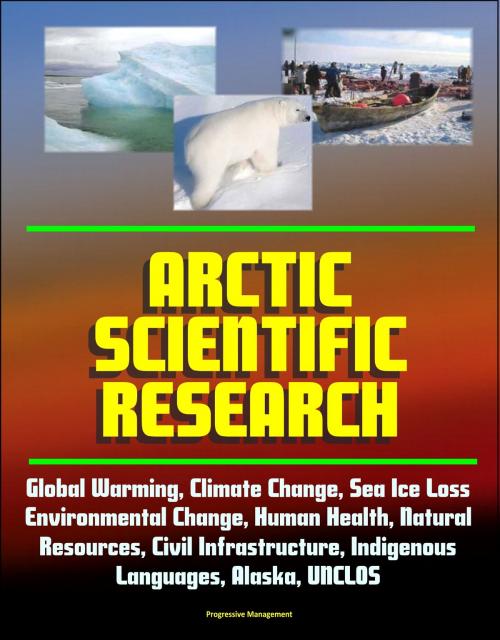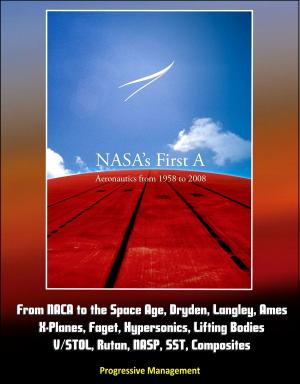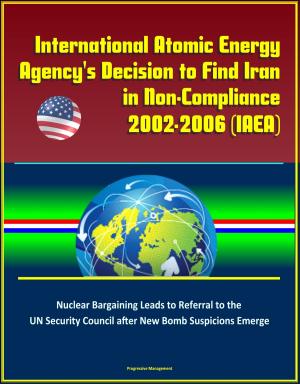Arctic Scientific Research: Global Warming, Climate Change, Sea Ice Loss, Environmental Change, Human Health, Natural Resources, Civil Infrastructure, Indigenous Languages, Alaska, UNCLOS
Nonfiction, History, Polar Regions, Science & Nature, Science, Biological Sciences, Ecology| Author: | Progressive Management | ISBN: | 9781311313300 |
| Publisher: | Progressive Management | Publication: | November 28, 2014 |
| Imprint: | Smashwords Edition | Language: | English |
| Author: | Progressive Management |
| ISBN: | 9781311313300 |
| Publisher: | Progressive Management |
| Publication: | November 28, 2014 |
| Imprint: | Smashwords Edition |
| Language: | English |
Four reports from the federal government provide unique information about Arctic scientific research, including goals and objectives for five priority research goals. Now more than ever, America's Arctic needs increased American attention and investment.
ENVIRONMENTAL CHANGE * Is the Loss of Arctic Sea Ice Linked to Severe Storms? * The Importance of Long-Term Data Sets and Monitoring * Souring Seas: Acidification and Its Potential Impact on Fisheries * Arctic Synthesis Projects * HUMAN HEALTH * Water and Sanitation * Food Security in Arctic Communities * NATURAL RESOURCES * Industry Shares Environmental Data * Oil Spills in Arctic Waters * Microbial Genetics and Arctic Oil Spill Response * CIVIL INFRASTRUCTURE * Scenario Planning * Vessel Traffic: Bering Strait * INDIGENOUS LANGUAGES * Revitalization of Arctic Indigenous Languages * COMMUNICATION AND COORDINATION * United Nations Convention on the Law of the Sea * International Arctic Research * The Interagency Arctic Research Policy Committee's Five Year Plan * The Arctic Update and Arctic Science Portal * EMERGING TOPICS IN THE ARCTIC
Dramatic changes in the environment and in resource development make it essential that important public and private decisions have the benefit of research, including timely and comprehensive information and a more thorough understanding of Arctic ecosystems, resources, and infrastructure challenges.
Additional research is needed to address national priorities related to energy and climate, ocean policy, health, conservation, national and homeland security, and keeping the United States competitive in the world economy. International investment in research and development has increased significantly in recent years, reflecting global interest in the Arctic. Oil and gas development, shipping, fishing, tourism, communication, and infrastructure construction are of intense interest to many countries, not just Arctic nations. Only with an active Arctic presence, which requires investment, as well as accession to the United Nations Convention on the Law of the Sea, can the United States help shape new patterns of activity in the Arctic that are consistent with our nation's best interests.
To meet national goals, USARC, IARPC agencies, the National Science Foundation, the White House Office of Science and Technology Policy, the Office of Management and Budget, and Congress must work together to encourage collaboration and the commitment of resources. With regard to Arctic transportation, we encourage prompt decisions, such as on how the nation will obtain the scientific research and maritime mission capabilities previously provided by the nation's polar-class icebreakers, commissioned over 35 years ago, which are currently out of service. With a rapidly changing Arctic Ocean, these capabilities are required for research, law enforcement, environmental protection, emergency response, search and rescue, maritime commerce, and national and homeland security.
Four reports from the federal government provide unique information about Arctic scientific research, including goals and objectives for five priority research goals. Now more than ever, America's Arctic needs increased American attention and investment.
ENVIRONMENTAL CHANGE * Is the Loss of Arctic Sea Ice Linked to Severe Storms? * The Importance of Long-Term Data Sets and Monitoring * Souring Seas: Acidification and Its Potential Impact on Fisheries * Arctic Synthesis Projects * HUMAN HEALTH * Water and Sanitation * Food Security in Arctic Communities * NATURAL RESOURCES * Industry Shares Environmental Data * Oil Spills in Arctic Waters * Microbial Genetics and Arctic Oil Spill Response * CIVIL INFRASTRUCTURE * Scenario Planning * Vessel Traffic: Bering Strait * INDIGENOUS LANGUAGES * Revitalization of Arctic Indigenous Languages * COMMUNICATION AND COORDINATION * United Nations Convention on the Law of the Sea * International Arctic Research * The Interagency Arctic Research Policy Committee's Five Year Plan * The Arctic Update and Arctic Science Portal * EMERGING TOPICS IN THE ARCTIC
Dramatic changes in the environment and in resource development make it essential that important public and private decisions have the benefit of research, including timely and comprehensive information and a more thorough understanding of Arctic ecosystems, resources, and infrastructure challenges.
Additional research is needed to address national priorities related to energy and climate, ocean policy, health, conservation, national and homeland security, and keeping the United States competitive in the world economy. International investment in research and development has increased significantly in recent years, reflecting global interest in the Arctic. Oil and gas development, shipping, fishing, tourism, communication, and infrastructure construction are of intense interest to many countries, not just Arctic nations. Only with an active Arctic presence, which requires investment, as well as accession to the United Nations Convention on the Law of the Sea, can the United States help shape new patterns of activity in the Arctic that are consistent with our nation's best interests.
To meet national goals, USARC, IARPC agencies, the National Science Foundation, the White House Office of Science and Technology Policy, the Office of Management and Budget, and Congress must work together to encourage collaboration and the commitment of resources. With regard to Arctic transportation, we encourage prompt decisions, such as on how the nation will obtain the scientific research and maritime mission capabilities previously provided by the nation's polar-class icebreakers, commissioned over 35 years ago, which are currently out of service. With a rapidly changing Arctic Ocean, these capabilities are required for research, law enforcement, environmental protection, emergency response, search and rescue, maritime commerce, and national and homeland security.















